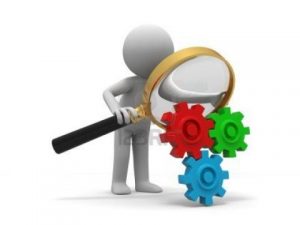How do we gather information at the poker table? It may seem like a simple question, but there's more to it than meets the eye. The problem is not just collecting the information itself, but also filtering it from the informational noise. Once the noise is removed, we need to interpret and use the gathered information while playing. Although
we usually perform most of this task automatically, it is not simple.
 The process starts with information gathering. Accumulating information means not just playing at the poker table and letting all events unfold. This action can be described as the art of selective attention. Human beings are inherently imperfect; we lack certain qualities, and we may miss certain things. Our attention and perception are limited. For this reason, we have to decide which elements of the poker match to focus on and which to ignore. Selective attention is the process that refines important information from the entire stream of incoming data.
The process starts with information gathering. Accumulating information means not just playing at the poker table and letting all events unfold. This action can be described as the art of selective attention. Human beings are inherently imperfect; we lack certain qualities, and we may miss certain things. Our attention and perception are limited. For this reason, we have to decide which elements of the poker match to focus on and which to ignore. Selective attention is the process that refines important information from the entire stream of incoming data.
Most people imagine that high-level poker players are somehow special and can filter information better than others. That they are more observant or have some innate ability to notice tells and choose better playing patterns.
However, this is complete nonsense. If high-level players can more clearly notice certain tendencies and interpret them into clearer patterns, it is only for two reasons. First, they have had a massive amount of experience in creating psychological models, which has sharpened their sensitivity and made it much easier for them to recreate these models while playing. Second, they have had a lot of experience with unusual situations, and all of this has transferred to their subconscious, freeing their conscious mind to focus on the psychological game. In other words, master poker players are not capable of concentrating more or in a more special way; they have simply experienced all of this before, allowing their minds to focus on other problems. Their conscious attention is free and can look for subtler tells, structures, or other valuable information that a weaker player does not have time to look for.
And if you want to improve your observation skills in ways other than just gaining experience? Although harsh, real experience is the most important factor, there are a few other ways that can help.
The first way to train observation is simply to focus on it. This seems too obvious to state, but remember that being focused is something you can do yourself, not something you just experience. Of course, sometimes you will be focused without even thinking that you need to do it. But you should not let your inner moods control you. Reminding yourself to focus on observing your opponent when your mind switches to autopilot and you start daydreaming about something can be very helpful. Concentrate! Tell yourself this from time to time and remember that focus can be an active and conscious process.
When observing your opponent, pay attention to every situation and try to understand what each one tells you about the opponent's game. See specific spots and try to see how they fit into the overall player profile. Again, this will not happen automatically. You will have to force yourself to actively and meticulously process the incoming information about their psychology, betting patterns, etc. Observe, interpret, and fill in your opponent's profile further.
One of the best ways to do this is to express it (both out loud and silently). For example, if you see that someone consistently checks back a lot of draws on the turn, tell yourself: “He checks back a lot of draws on the turn, which means he doesn't like to take risks, rarely semi-bluffs, and his range is value-based. I should put him on a draw on the river.” Of course, you will not always have such clear conclusions from every hand. But it is important to remind yourself of the evidence for your reads, not just constantly repeat the reads themselves. The more conscious and evidence-based a read is, the more naturally you will handle various observation subtleties. And not only that. Reviewing your conclusions consciously and clearly will “imprint” them more into your mind, making them easier to recognize, remember, and act upon.
If you play online, you should always use notes and constantly update your observations. The art of note-taking is very subjective, and different things affect people differently. The most important thing is to take notes often, consistently, and use them effectively. Ideally, your  notes should mostly include things like:
notes should mostly include things like:
1) Marking significant events, e.g.: “He made a call down with bottom pair on an XYZ board.”
2) Observations of psychological reads, e.g.: “Likes to bluff twice in a row” or “Doesn't like to take risks.”
3) Bet-sizing notes, e.g.: “Overbet his flushes on the river.”
4) Notes on how to play against him, e.g.: “When he has a flush, make small bets because he likes to raise small bets.”
Remember, notes are valuable not only because you can pull them out and read them when you feel lost or have forgotten your reads. Notes are primarily valuable because they strengthen the impressions in your mind and help you remember them more easily. The process of consistently taking notes will force you to better remember your reads, even if you never open those notes. Also, your consciousness will become more attentive to the opponent when you play, so if you are not taking notes yet, start now.
You have probably noticed that many good players seem to have amazing observation skills but often cannot clearly express how they know what they know. If you try to press them on how they made that read, they will just shrug and say they knew it. And once again, these players are not somehow more special than others or some kind of geniuses. Their observation skills have been transferred to the subconscious. These players' automatic minds have been trained to evaluate, synthesize, and recreate opponents' actions naturally.
You do not have direct control over your subconscious concept of the opponent, but you can pay active attention to their game and use conscious skills to break into your subconscious. You can do this through self-talk, active exploration, and reformation of the player's mind theory, note-taking, and consciously working with your observations. If you do this consistently and often enough, gradually, over time, this process will become automated and move into your subconscious.
Turn poker into an exploration of your opponent. Identify with them. Breathe their air. Observe them, learn from them, move them, and gather information about their weaknesses and strengths, their beliefs and fears. Only then will you be able to understand your opponent and, with a bit of luck, predict their actions. There is no better feeling in poker than achieving mastery in analyzing your opponent's mind.





